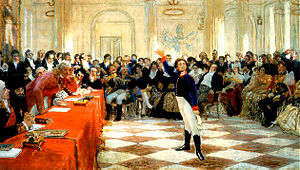Gavrila Romanovich Derzhavin
Gavrila Romanovich Derzhavin (Гаври́ла Рома́нович Держа́вин, July 14, 1743 – July 20, 1816) was the greatest Russian poet before Alexander Pushkin. Although his works are traditionally assigned to the literary Classicism, his best verse is full of antitheses and conflicting sounds in the way reminiscent of John Donne and other Metaphysical poets.
Life
Born and educated in Kazan, he rose from the ranks as a common soldier to the highest offices of state under Catherine the Great. He was the governor of Olonets (1784) and Tambov (1785), personal secretary to the Empress (1791), President of the College of Commerce (1794), and Minister of Justice (1802). He retired in 1803 and spent the rest of his life in the country estate at Zvanka near Novgorod, writing idylls and anacreontic verse. He was buried in the Khutyn Monastery near Zvanka, reburied by the Soviets in the Novgorod Kremlin and then reinterred at Khutyn.
Works
Derzhavin is best remembered for his odes, dedicated to the Empress and other courtiers. He paid little attention to the prevailing system of genres, and many a time would fill an ode with elegiac, humorous or satiric contents. In his grand ode to the Empress, for instance, he mentions searching for fleas in his wife's hair and compares his own poetry with lemonade.
Unlike other Classicist poets, Derzhavin found delight in the carefully chosen details, like a colour of wallpaper in his bedroom or a poetical inventary of his daily meal. He believed that the French was a language of harmony, the Russian was a language of conflict. Although he relished harmonious alliterations, sometimes he would deliberately instrument his verse to the effect of cacophony.
Derzhavin's major odes were the impeccable "On the Death of Prince Meschersky" (1779); the playful "Ode to Felicia" (1784); the lofty "God" (1785), which was translated into all languages of Europe; "Waterfall" (1794), occasioned by the death of Prince Potemkin, and "Bullfinch" (1800), a poignant elegy on the death of his friend Suvorov. He also provided lyrics for the first Russian national anthem, Let the sound of victory sound!
Influence
According to D.S. Mirsky, "Derzhavin's poetry is a universe of amazing richness; its only drawback was that the great poet was of no use either as a master or as an example. He did nothing to raise the level of literary taste or to improve the literary language, and as for his poetical flights, it was obviously impossible to follow him into those giddy spheres"[1]. Nevertheless, Nikolai Nekrasov professed to follow Derzhavin rather than Pushkin, and Derzhavin's line of broken rhythms was continued by Marina Tsvetaeva in the 20th century.
Memorable lines
- Gde stol byl yastv, tam grob stoit (English: Where used to be a table full of viands, a coffin now stands)
- Ya tsar, - ya rab, - ya cherv, - ya bog (English: I'm a czar - I'm a slave - I'm a worm - I'm a God)
Lines found at Derzhavin's table after his death

- The current of Time's river
- Will carry off all human deeds
- And sink into oblivion
- All peoples, kingdoms and their kings.
- And if there's something that remains
- Through sounds of horn and lyre,
- It too will disappear into the maw of time
- And not avoid the common pyre... <lines broken>
Notes
- ↑ D.S. Mirsky. A History of Russian Literature. Northwestern University Press, 1999. ISBN 0-8101-1679-0. Page 53.
Further reading
- Y. K. Grot. Life of Derzhavin. SPb, 1883 - great biography by a first-rank scholar
- V. F. Khodasevich. Derzhavin. Berlin, 1931 - a literary masterpiece in its own right.
External links
- Works by Gavrila Romanovich Derzhavin. Project Gutenberg
- Illustrated timeline
- Luba Golburt, "Derzhavin's monuments: Sculpture, Poetry, and the Materiality of History", Toronto Slavic Quarterly 13, Summer 2005, retrieved 23 October 2006.
Credits
New World Encyclopedia writers and editors rewrote and completed the Wikipedia article in accordance with New World Encyclopedia standards. This article abides by terms of the Creative Commons CC-by-sa 3.0 License (CC-by-sa), which may be used and disseminated with proper attribution. Credit is due under the terms of this license that can reference both the New World Encyclopedia contributors and the selfless volunteer contributors of the Wikimedia Foundation. To cite this article click here for a list of acceptable citing formats.The history of earlier contributions by wikipedians is accessible to researchers here:
The history of this article since it was imported to New World Encyclopedia:
Note: Some restrictions may apply to use of individual images which are separately licensed.
